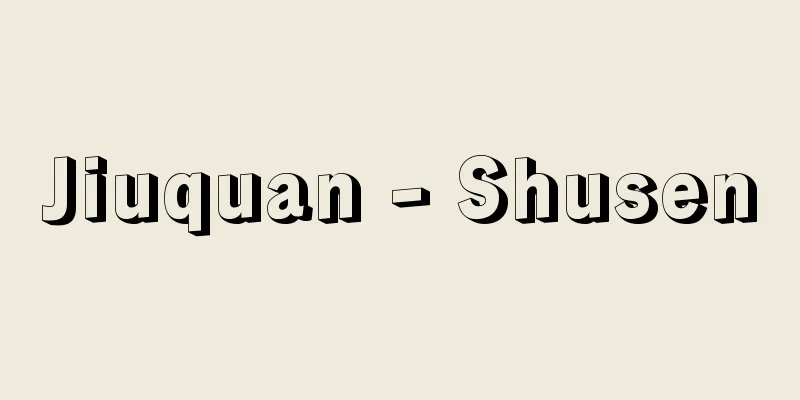Kikujido - Kikujido

|
The title of a Noh piece. The fourth piece. Author unknown. It exists in every school, but is called "Makura Jido" in schools other than the Kanze school. Kanze's "Makura Jido" is a different piece. A vassal (waki) of Emperor Wen of the Chinese Wei Dynasty is ordered by the Emperor to search for medicinal water that springs at the foot of Mount Rekigasaki, and meets Kikujido (shite: Jido mask, black head, happi coat or Chinese woven tsuboori, chrysanthemum leaf fan) in a hut in the mountains full of blooming chrysanthemum flowers (a pillow is placed on a one-tatami mat platform surrounded by a chrysanthemum fence at the front of the stage, and the baby dolls are pulled around a straw hut with a chrysanthemum fence in front of them). A benevolent boy who served King Mu of the Zhou Dynasty, who was exiled for the crime of overstepping his pillow, wrote two lines of verses from the "Fumonbon" (the Great Gate Chapter) on a chrysanthemum leaf, which the king had given him as a pillow, and the dew from the leaf trickled down and became an elixir of life. Drinking this elixir, he lived to be 700 years old. The boy then entered the house of a hermit in Yamaji, and was recommended to drink the chrysanthemum water. His kogaki (small writings) include "Mae Mae" and "Banshiki" from the Kongo school, and "Yumu no Raku" from Umewaka. It is said to be based on the story in "Ryoma Shinsoji" (The Tale of the Great Peace), Volume 13. It has also been incorporated into Nagauta, and there is a piece of the same name in Kamigata-mai. Source: Encyclopaedia Britannica Concise Encyclopedia About Encyclopaedia Britannica Concise Encyclopedia Information |
|
能の曲名。四番目物。作者未詳。各流にあり,観世流以外は『枕慈童』という。観世の『枕慈童』は別の曲。中国の魏の文帝の臣下 (ワキ) が,勅命によりれき県山のふもとに湧出る薬水をたずねていくと,菊の花の咲き乱れた山中の庵 (舞台正面の菊籬をめぐらした一畳台に枕を置き,大小前に菊籬をつけた藁屋に引回しをかける) で菊慈童 (シテ〈慈童面,黒頭,法被か唐織壺折,菊の葉うちわ〉) に会う。周の穆 (ぼく) 王に仕えた慈童で,枕をこえた罪で流されたが,王から賜わった枕の『普門品』の2句の偈 (げ) を菊の葉に書き写したところ葉の露がしたたって不老不死の薬となり,それを飲んで 700歳を保っていることを語り,その菊水をすすめて,慈童は山路の仙家に入る。小書 (こがき) に,金剛流の「前後」「盤渉 (ばんしき) 」,梅若の「遊舞之楽」などがある。『太平記』巻十三「龍馬進奏事」の話を出典とするという。長唄にも取入れられているほか,上方舞に同名曲がある。
出典 ブリタニカ国際大百科事典 小項目事典ブリタニカ国際大百科事典 小項目事典について 情報 |
Recommend
voluntaristic theory of action
… Parsons made his debut in academia in 1937 with...
"A glimpse into Italy" - Itariakanken
…He gained the favor of the Whig 1st Earl of Hali...
Ginkgo monk - Icho Osho
...A type of entertainment at a vaudeville hall. ...
Chameleon - Kamereon (English spelling) chameleon
A general term for lizards belonging to the Chama...
U-Tsang dialect - U-Tsang dialect
...the language of the Tibetan people living in t...
Ushirohama
Please see the "Maehama" page. Source: ...
Lateolabrax latus (English spelling) Lateolabraxlatus
… [Kenji Mochizuki]. … *Some of the terminology t...
Osawa Pond - Osawa Pond
A pond located to the east of Daikakuji Temple in...
Laspeyres index - Laspeyres index
An index calculated based on a proposal by German...
Tim Guard
The remains of a Roman city in the Atlas Plateau i...
Visit to Yahiko Shrine - Visit to Yahiko Shrine
…In the Middle Ages, much of the shrine's lan...
Principle of Superposition - The Principle of Superposition
If there exists a phenomenon in which a certain p...
Lykeion
…Generally, kinesis is the transition from potent...
Australopithecines - Australopithecus rui (English spelling)
A fossil hominoid belonging to the earliest stage ...
Galerida
... The Melanocorhynchus genus, found mainly in A...









